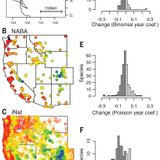RECENT ARTICLES

Fewer butterflies seen by community scientists across the warming and drying landscapes of the American West
You are currently viewing the abstract.AAAS login provides access to Science for AAAS members, and access to other journals in the Science family to users who have purchased individual subscriptions.Log in via OpenAthens.Log in with your institution via Shibboleth.Download and print this article for your personal scholarly, research, and educational use.Buy a single issue of Science for just $15 USD.Many recent studies have revealed sweeping declines in insects over the past few decades. Butterflies are no exception. Forister et al. used three different datasets, collected by both experts...…You are currently viewing the abstract.AAAS login provides access to Science for AAAS members, and access to other journals in the Science family to users who have purchased individual subscriptions.Log in via OpenAthens.Log in with your institution via Shibboleth.Download and print this article for your personal scholarly, research, and educational use.Buy a single issue of Science for just $15 USD.Many recent studies have revealed sweeping declines in insects over the past few decades. Butterflies are no exception. Forister et al. used three different datasets, collected by both experts...WW…

Genomic evidence for two phylogenetic species and long-term population bottlenecks in red pandas
The red panda (Ailurus fulgens), an endangered Himalaya-endemic mammal, has been classified as two subspecies or even two species – the Himalayan red panda (A. fulgens) and the Chinese red panda (Ailurus styani) – based on differences in morphology and biogeography. However, this classification has remained controversial largely due to lack of genetic evidence, directly impairing scientific conservation management. Data from 65 whole genomes, 49 Y-chromosomes, and 49 mitochondrial genomes provide the first comprehensive genetic evidence for species divergence in red pandas, demonstrating...…The red panda (Ailurus fulgens), an endangered Himalaya-endemic mammal, has been classified as two subspecies or even two species – the Himalayan red panda (A. fulgens) and the Chinese red panda (Ailurus styani) – based on differences in morphology and biogeography. However, this classification has remained controversial largely due to lack of genetic evidence, directly impairing scientific conservation management. Data from 65 whole genomes, 49 Y-chromosomes, and 49 mitochondrial genomes provide the first comprehensive genetic evidence for species divergence in red pandas, demonstrating...WW…
- Total 2 items
- 1